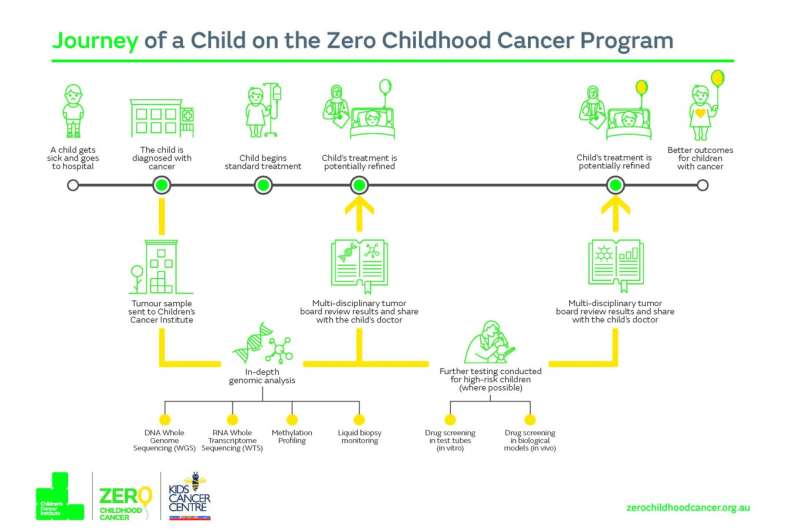This article has been reviewed according to Science X's editorial process and policies. Editors have highlighted the following attributes while ensuring the content's credibility:
fact-checked
peer-reviewed publication
proofread
World-first study into precision medicine for high-risk childhood cancer yields promising results

In a world-first, Australian researchers and clinicians have shown that precision medicine—where treatment is tailored to an individual child's cancer—leads to significantly improved outcomes in children with high risk cancer.
In a study published in Nature Medicine researchers found that precision medicine (also called personalized medicine) was shown to be superior to standard or non-guided therapy, both in terms of clinical response and survival.
A staggering 55% of children who received their personalized treatment achieved complete or partial remission, or had their disease stabilized for at least six months. Given that these children had highly aggressive cancers which, in many cases, had already failed to respond to standard therapy, these are remarkable results.
These children had been observed for an average of three years after receiving their personalized treatment. Treatment recommendations were given to their oncologists after detailed genetic analysis of the driver genes in the tumor.
This strategy matched the drug better to each child's cancer driver genes, often suggesting drugs that are not normally used to treat that cancer type. The results show, for the first time, that this led to an improvement in progression-free survival.
"These are very exciting results which we believe have important implications for the treatment of children with cancer," said Professor David Ziegler, Chair of Clinical Trials for the Zero Childhood Cancer Program and senior author on the paper.
"We've already shown that precision medicine can help identify new treatment options for many high-risk patients. Now we've shown that it not only can shrink their tumors, but also lead to a significant improvement in long term survival for those patients."
Over a minimum follow-up period of 18 months, the study included 384 children with high-risk cancers (with a very low chance of cure) enrolled on the Zero Childhood Cancer Program (ZERO), Australia's national precision medicine program for children with cancer. ZERO is jointly led by Children's Cancer Institute and Kids Cancer Center at Sydney Children's Hospital, Randwick and involves nine child cancer treatment centers in the country.
This study involved more than 100 scientists and clinicians working together across all these nine child cancer centers.
To determine the impact on survival, the researchers measured "progression-free survival," the length of time that a patient lives without their cancer getting any worse. The results showed that children who received a ZERO-recommended treatment did significantly better than those who did not. In fact, their 2-year progression-free survival was more than double that of children who received standard therapy (26% vs. 12%), and five times higher than that of children who received an unguided treatment (a novel agent not chosen on the basis of molecular findings).
Importantly, the study found that children who received their recommended therapy early on in their treatment pathway did significantly better than those who received it after their disease had progressed, suggesting that the sooner a personalized treatment strategy can be implemented, the better the chance of preventing relapse and death.
Associate Professor Loretta Lau, a pediatric molecular oncologist at Kids Cancer Center, researcher at Children's Cancer Institute and first author on the paper, and Professor Glenn Marshall AM, Clinical Lead of ZERO and co-senior author on the paper, said the world-first study shows that precision medicine has the potential to change the model of care for children with cancer.
"Our study provides important new evidence that response to precision-guided therapy translates into improved survival," said A/Prof Lau and Prof Marshall. "This work provides some hope to families where none previously existed in a new model of treatment for high-risk childhood cancer which is changing national and international clinical practice."
Prof Ziegler, who is both a pediatric oncologist at the Kids Cancer Center and a research leader at Children's Cancer Institute, said, "We've shown that matching a therapy to a patient through molecular analysis of their cancer, and implementing that targeted therapy early on, are key to achieving the best possible results."
ZERO's first national precision medicine trial began in 2017, focusing on identifying new treatment options for children with high-risk cancers.
It is the first time that precision medicine has been made available to every child diagnosed with cancer, not just in Australia, but in any country in the world.
More information: Loretta M. S. Lau et al, Precision-guided treatment in high-risk pediatric cancers, Nature Medicine (2024). DOI: 10.1038/s41591-024-03044-0



















